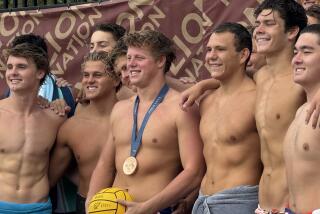She Has a Healthy Attitude
- Share via
Sticks and stones didn’t break her bones -- rather, it was elbows and an innocent-looking yellow rubber water polo ball.
Either way, Robin Beauregard’s medical history would seem to give her a leg up -- or is that an arm up? -- when it comes to a future career as a physical therapist.
“Many injuries, surgery on multiple parts of my body,” said the owner of a silver medal from the 2000 Olympics and gold medal from the 2003 World Championships in Barcelona, Spain.
But ...
“She’s been fairly healthy for a long period of time now ... for Robin,” said Guy Baker, the U.S. Olympic women’s water polo coach.
Certainly it is fortuitous news for the top-ranked U.S. team with the Athens Olympics a few weeks away, and just as ominous for the world’s top centers, such as Italian star Guisi Malato. You see, a not-so-sound Beauregard scored six goals at the Sydney Olympics -- including a hat trick against Canada in the second game.
Additional international game experience has helped the 25-year-old defender from Huntington Beach and her teammates take their game to the next level. Beauregard scored once in the United States’ 10-9 victory over Italy in a World League semifinal on Saturday night in downtown Long Beach. The U.S. will play Hungary in tonight’s championship game at 8:30.
“Some people do a good job of defending but they don’t have the offensive package too,” Baker said. “Most of the defenders play on the perimeter on the outside, so the better ones are good outside shooters also.
“Robin was one of the best defenders in the Sydney Olympics also. She’s more experienced, and stronger and a lot fitter. She had injuries at the Olympics going in and we were just fortunate enough to have her healthy enough to play.”
Baker used to have to encourage her to shoot more, using her impressive arm.
“It’s hard, sometimes, because you’re so used to defense and you go on offense trying to read other defenses and find the best shot,” Beauregard said. “It always takes a second or two to sink in: ‘I’m the person who is open, oh yeah, I should kind of move in.’ ”
Sydney turned out to be one of the reasons Beauregard changed her plans and decided to continue on through Athens, not fully satisfied with her performance in 2000, even though she could have used the injuries as an excuse. In between, she earned her degree from UCLA, double-majoring in psychobiology and physiological science, and will start her physical therapy training at USC immediately after Athens.
The broken nose in college and other assorted injuries were bumps on what has been a long road from the days when she played with the boys’ team at Huntingon Beach Marina High.
“She gave just as much as she took,” said Darin Smith, her friend and high school teammate at Marina. “She was an awesome player. She started for our high school team and we went to the [Southern Section] final.
“I think she had to have been [extra motivated] because when she was playing, there wasn’t a women’s team. So she was playing with guys.”
And that hasn’t changed. Beauregard is one of seven Sydney veterans on the current Olympic squad.
One of the lasting images of the 2000 Olympics is the United States losing to Australia under chaotic, controversial circumstances in the gold-medal game, going out on a questionable goal as time elapsed in regulation. It was the first Olympic water polo tournament for women and a crowd of 17,000 was on hand for the gold-medal game.
Just as enduring was the mature manner in which the players handled the defeat
“It was disappointing to lose in the last second, but we were probably the only people in the world that thought we would be in that game,” Beauregard said.
Any disappointment quickly waned.
“Right away, when we first got out of the pool and we’re standing at the podium and you’re kind of bummed out because you just lost your game,” she said. “Then, after you’ve thought about it, ‘Wait a minute, I have a silver medal in the Olympics. How many people can really say that?’
“Then you come home and show your medal to people. And nobody is like, ‘Oh, you lost.’ Everybody is like, ‘Oh ... that is so great.’ They get to hold it and you just feed off the energy of everybody else.”
The medal also illustrated the particular closeness of the team. Beauregard had heard and read about athletes losing their Olympic medals. So she gave her silver medal to her parents for safekeeping.
They returned home with it to Southern California. But then TV wanted all of the Southern California athletes to appear on a program in Sydney with their medals. One of Beauregard’s teammates, Brenda Villa, did not want her to be the only one on the hot seat with Fred Roggin for not having her medal.
“Brenda was nice enough not to bring her medal,” Beauregard said. “[Roggin] was like, ‘Why don’t you guys have your medals?’ I’m like, ‘I sent mine home with my mom.’ Brenda was like, ‘Solidarity.’ ”
In and out of the pool.
More to Read
Go beyond the scoreboard
Get the latest on L.A.'s teams in the daily Sports Report newsletter.
You may occasionally receive promotional content from the Los Angeles Times.







